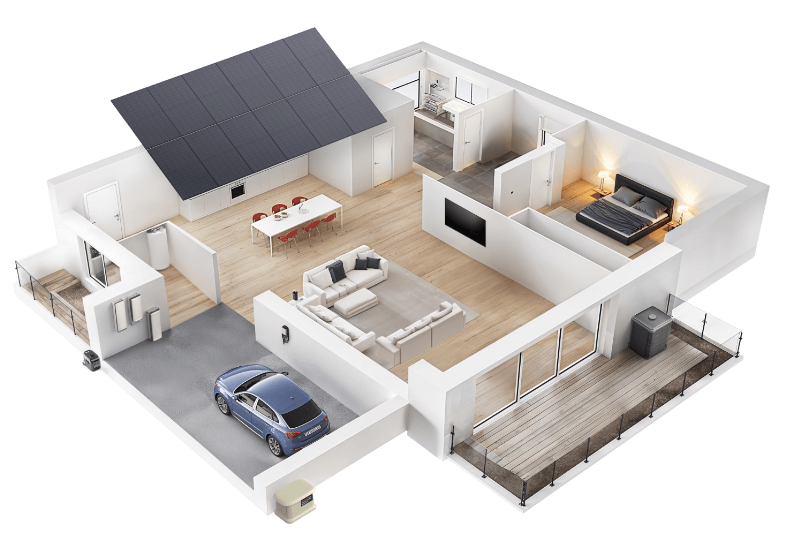Look Ahead to Home Energy Storage
Home energy storage refers to devices that store electricity for later use. These systems are becoming popular as more people look for ways to power their homes efficiently. Energy storage helps homeowners rely less on the electricity grid and reduce power bills. This article will help you understand the importance of home energy storage and how it can change the way you use energy in the future.
Market Trends of Home Energy Storage
The home energy storage market is experiencing rapid growth, projected to expand from USD 2.69 billion in 2024 to USD 4.58 billion by 2030 at a 9.3% CAGR. This growth is largely driven by a few key factors:
Rising Demand for Solar and Storage Systems
The increasing adoption of solar panels has directly increased the need for energy storage solutions. As more homes install solar systems, there is a growing need to store excess energy produced during the day for use at night or on cloudy days. According to market trends, solar and storage systems are expected to dominate the market as consumers are becoming more aware of the benefits of renewable energy, driving demand for these systems.
High Electricity Prices and Blackouts
Areas where electricity prices are high or blackouts are frequent are seeing an increased demand for home energy storage. These systems allow homeowners to avoid peak demand charges and continue to power essential devices during power outages. For example, energy storage systems help mitigate issues in regions with unreliable grids, offering more grid independence. They also reduce the stress on local grids by providing short-term energy support during peak hours.
Technological Advancements in Battery Systems
Battery technology is evolving rapidly, leading to more efficient, cost-effective, and longer-lasting systems. For example, innovations in lithium-ion batteries, which now offer higher energy densities, are making energy storage more accessible for homeowners. These advancements have led to reduced battery costs and increased production capacities, which help make energy storage systems more affordable.
Supportive Government Policies
Government incentives are also playing a major role in the growth of the energy storage market. With programs like tax credits, low-interest loans, and grants, homeowners are increasingly able to invest in solar storage systems without the heavy initial costs. These policies are expected to continue to drive market expansion, making sustainable energy solutions more financially accessible.
What’s Good About Home Energy Storage
Home energy storage systems give people more control over how and when they use electricity. Below are the most important benefits, explained with clear examples:
Save Money on Electricity
Many areas charge more for electricity during peak hours, usually in the late afternoon and evening. With a home energy storage system, you can store power during the day—especially from solar panels—and use it when electricity prices go up. This helps lower your monthly power bill.
Also, some places offer feed-in tariffs, which give money back when extra solar energy is sent to the grid. Storing energy first, then using what you need, helps you keep more value from the power you produce.
Less Dependence on the Grid
Home energy storage systems help reduce your need to rely on the public power grid. If the grid has a problem or if there is a blackout, you can keep running key devices like your refrigerator, lights, internet, or medical equipment.
This is especially useful in areas with unreliable power supply or during natural disasters. Some advanced storage systems even work together with solar panels to run a home fully off-grid during the day.
Lower Carbon Footprint
Using energy from clean sources like the sun helps reduce the use of fossil fuels such as coal or natural gas. When paired with solar panels, home energy storage can cut down the amount of carbon your home adds to the air.
Governments and energy experts see home storage as part of a bigger plan to build a cleaner and more sustainable energy system. Using more energy on-site, instead of sending it through power lines, also reduces losses that happen during long-distance electricity transport.
Support for the Energy Grid
Smart home batteries can help the power grid, too. When connected to the internet, they may provide support during times of high demand. For example:
- Peak demand relief: Batteries can supply stored energy when many people are using electricity at the same time.
- Frequency control: Some systems react in real time to small changes in power levels, helping keep the grid stable.
These actions reduce the need for large, polluting power plants that only run during peak hours, such as diesel backup generators.


Common Forms of Home Energy Storage
Home energy storage systems come in different forms:
| Storage Type | Description | Advantages |
| Solar Storage Systems | Solar panels generate electricity during the day and store it in batteries for later use. | Lower electricity bills, reduced grid dependence, sustainable. |
| Pico Hydro (Hydroelectric) | Small-scale hydro systems that use water flow to generate electricity. | Good for homes near water sources, provides continuous energy. |
| Thermal Energy Storage | Stores heat during the night and uses it during the day (e.g., for heating water). | Cost-effective, great for energy-saving in colder regions. |
Are Solar and Storage Systems on the Rising Trajectory?
Yes, solar energy and home storage systems are on the rise. As more homes add solar panels, the need for storage grows. These systems can store extra energy during sunny days for use at night or on cloudy days. With the falling cost of solar panels and the growing interest in sustainability, more homeowners are choosing to install solar systems with storage. This trend is expected to keep growing as new technologies improve efficiency and lower prices.
How to Get Started With Solar
If you're ready to take control of your energy, investing in a solar storage system is one of the smartest steps you can take. For large homes, it's not just about saving money—it's about stability, safety, and long-term independence. Here’s what you can to begin:
Start With a Strong Storage System
A powerful battery system lets you store solar energy and use it when the grid is down or rates are high. EcoFlow OCEAN Pro is designed for full-home support. It offers up to 80 kWh of storage and 24 kW output, enough to run your entire house, even large appliances and heating or cooling systems.
Pair It With Solar Panels
Solar panels collect energy during the day. OCEAN Pro stores that energy for night use or outages. It supports up to 40kW of solar input and works with a wide range of panel types, giving you freedom in system design.
Choose a Certified Installer Near You
EcoFlow partners with local certified installers for quick response and professional setup. The system is modular and simplified, so installation is faster and easier than most traditional systems.
Manage Everything From Your Phone
Once installed, the EcoFlow app lets you track power use, battery level, and savings in real time. You can also join virtual power programs in some areas and get paid for extra stored energy.
Install Before Incentives Change
The 30% federal tax credit is still available in 2025, but it may end soon. Installing your solar storage system now locks in the savings and boosts your home’s value for years to come.
EcoFlow OCEAN Pro makes solar storage simple, powerful, and future-ready. It’s the system built for full-home energy freedom—starting the moment you turn it on.


FAQs
Q1. What does home energy storage usually use to store power?
Most systems use lithium-ion batteries. These batteries are small, powerful, and last a long time. Some newer systems are testing flow batteries and saltwater batteries, but lithium-ion is still the most common today.
Q2. Can old electric car batteries be reused in home energy storage?
Yes. Some companies take used EV batteries and give them a second life in homes. These batteries still work well for home use, even if they don’t hold enough charge for cars anymore. This reduces waste and lowers cost.
Q3. Is it bad for the environment to use batteries?
It depends on the type. Lithium-ion batteries can be hard to recycle. Lead-acid batteries are easier to recycle but don’t last as long and contain toxic lead. Saltwater batteries are safer for nature, but they are no longer sold widely.
Q4. Will home energy storage cause more people to leave the grid?
Yes, that trend is growing. As more people use solar and storage systems just for their own homes, fewer people pay to use the public grid. This can raise costs for others still on the grid and affect long-term upgrades to the system.
Q5. Are there other ways to store home energy besides batteries?
Yes. People can store heat using storage heaters or hot water tanks. Some homes use pico hydro systems if they have running water nearby. Others may try flywheels to store energy through spinning motion.
Whole Home Backup
For press requests or interview opportunities, reach out to our media team
media.na@ecoflow.com